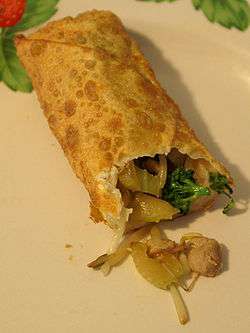Egg roll
|
An American-style egg roll and its filling | |
| Course | Hors d'oeuvre or side dish |
|---|---|
| Variations | Kab yob |
|
| |
| Egg roll | |||||||||||||||
| Chinese | 蛋卷 | ||||||||||||||
|---|---|---|---|---|---|---|---|---|---|---|---|---|---|---|---|
| Literal meaning | egg roll | ||||||||||||||
| |||||||||||||||
Egg roll is a term used for many different foods around the world.
Terminology
The term egg roll is commonly used in English speaking countries to refer to variations of fried foods involving filling wrapped in flat bread. The dish is considered a subtype of the spring roll in mainland China, with the Chinese term meaning egg roll referring to the biscuit roll instead.[1] Egg rolls are considered distinct from spring rolls outside of mainland China
Varieties
In Vietnamese cuisine an egg roll is a savory dish typically served as an appetizer similar in concept to what is commonly known as Spring roll in Asia but made with flour dough wrap instead and deep fried or baked resulting in a crispy product. There is another version known as Popiah which has a soft pan cooked wrapper with vegetable stuffing that are stir fried or steamed in a separate process. Egg rolls are usually stuffed with pork, shrimp, or chicken, adding cabbage, carrots, bean sprouts and other vegetables, and then deep fried. This variety of the egg roll is very common and popular, across even regional varieties of American Chinese food, and is often included as part of a "combination platter".[2][3][4][5]
In West Bengal in India, and especially Kolkata, "egg roll" refers to a fried egg wrapped inside a paratha fried flat-bread. After the paratha has been prepared, an egg is cracked on a pan and while the egg is still uncooked, the paratha is added. It is cooked until the egg is well done and is stuck to the paratha. After that, the contents are removed from the pan and sliced raw onions, sliced green chilis, sliced cucumbers, a squeeze of fresh lemon juice and black salt is added. An optional choice is adding tomato ketchup at the end. It is wrapped in paper and served as a take away street food. This delicacy was specially invented for the Colonial Britishers living in the then Calcutta as a quick snack.
In Britain and Australia, an "egg roll" can also refer to a fried egg in a bread roll (sometimes with bacon).[6][7][8] The terms "pancake roll", "mini spring roll" or "spring roll" are often used by Chinese restaurants in the UK and Australia to describe what is called an "egg roll" in the United States. In France, a similar hors d'œuvre is called a "nem" from the northern Vietnamese "nem" or "nem rán", and it is made from rice paper rolls that are then fried.
A "Mexican egg roll" is an egg roll wrap filled with beans, cheese, and, optionally, meat, as well as various peppers and spices. It is then deep-fried and served with sour cream or salsas, like the chimichanga. In Mexico the residents refer to it as a burrito or in some rare cases, a taquito. Though in many Chinese restaurants in Mexico, egg rolls are comparable to those in the U.S.
In the United States, several restaurant chains (such as Chili's) market a "Southwest Egg Roll", which is a Tex-Mex dish consisting of a deep-fried flour tortilla containing (among other ingredients) corn, black beans, spinach, chicken, Monterey jack cheese, peppers, and other spices. Other variations on the egg roll, especially common on menus of bar appetizers in the Northeastern United States, include the pizza roll (filled with tomato sauce and mozzarella cheese) and the cheese steak roll (imitating the Philadelphia cheese steak with chopped beef and cheese).
In Australia there is what is locally known as the Chiko Roll, an Australian savoury snack originally called the chicken roll and inspired by the Chinese egg roll and spring rolls.
The Vietnamese nem rán (alternatively, chả giò) is often called "egg roll" on menus in English-speaking countries, even though the wrapper is made out of rice paper rather than eggs and flour.
See also
- Biscuit roll
- Burrito
- Kabyob – Hmong egg rolls
- Kati roll – Indian egg rolls
- List of deep fried foods
- Lumpia – Eastern Asian egg rolls of Chinese origin
- Nem rán
- Pizza Rolls
- Pocket sandwich
- Spring roll
- Taquito
References
- ↑ "蔡瀾帶你食好嘢 (Chinese)". eastweek. 16 July 2011. Retrieved 26 October 2012.
- ↑ Chinese Appetizer Wrappers - For Dummies
- ↑ Egg Roll | Egg Roll Recipe | Easy Asian Recipes at RasaMalaysia.com
- ↑ Menu - P.F. Chang's China Bistro
- ↑ How To Make Spring Rolls : Article - GourmetSleuth
- ↑ http://www.theguardian.com/lifeandstyle/2010/sep/20/crispy-bacon-egg-roll
- ↑ http://www.eatori.com/2013/05/is-this-the-worlds-best-bacon-and-egg-roll-breakfast-at-dishoom.html
- ↑ http://www.pret.com/menu/hot_food/british_bacon_omelette_roll_PUK5526.shtm

